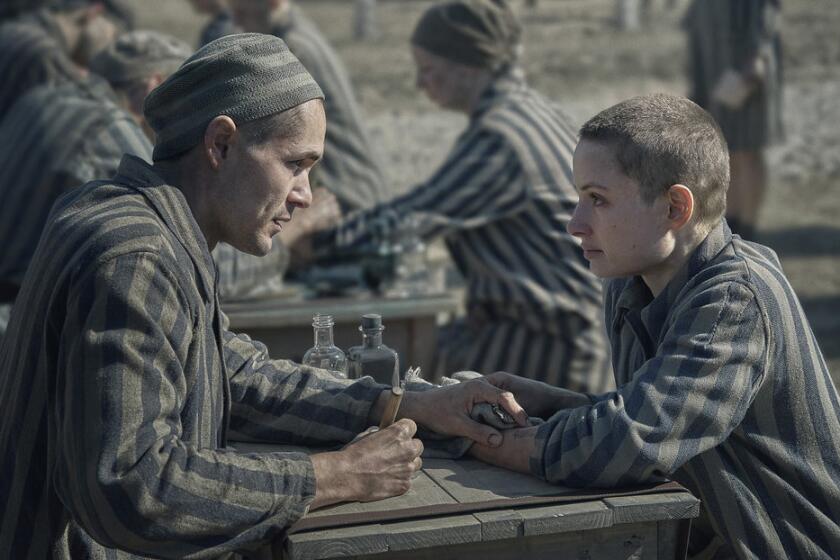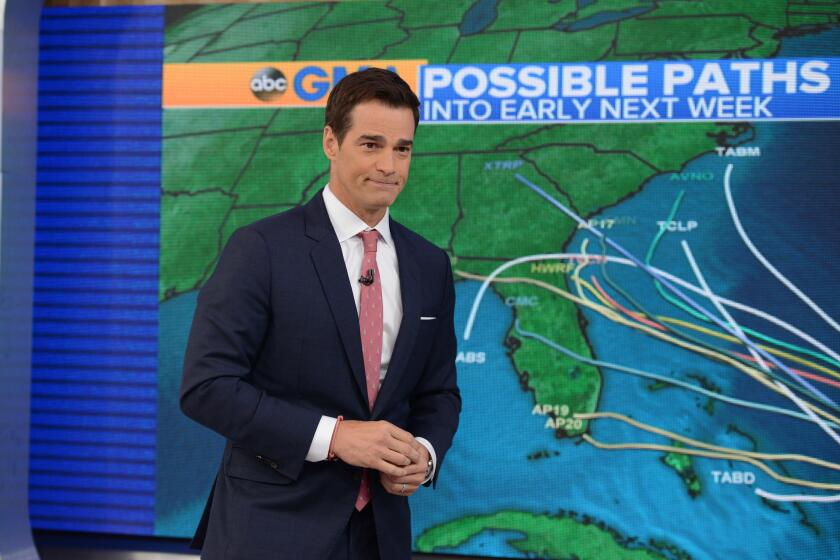A CABLE CAPO’S LEGACY
BY the time academics started to publish essays like “Stripper Iconography and Sex Worker Feminism on The Sopranos,” it was apparent HBO’s drama about an anxious, brutal, suburban mob boss might be more than just a TV show.
Since the show launched eight years ago, the cable network’s upscale audience bought up “Sopranos” bowling shirts and cookbooks, joined in conspiracy-filled “Sopranos” Internet sites, took pole dancing lessons and started speaking in Sopranoisms (“whacked,” “all due respect”). At its peak in 2004, “The Sopranos” had 14.4 million viewers per episode. And HBO sold the show in 2005 in a record syndication deal to A&E; that earlier this year started introducing “The Sopranos” to millions of new viewers.
In their many anthologies, the academics tried to explain the phenomenon: “The Sopranos” represented shifts in masculine identity. It was about the American family in the 21st century, American consumption, class in America. It diminished Italian Americans, it honored Italian Americans. It overflowed with psychotherapeutic and philosophical insights.
The show, created by David Chase, in part to exorcise the formidable maternal presence in his own life, “had a seismic effect on the whole culture,” said director Peter Bogdanovich, reflecting the tone of commentators who reached for superlatives to lavish on the series. On a smaller scale, Bogdanovich, who plays a therapist’s therapist on the series, said the show renewed a professional identity for him as an actor.
Even producer and well-known industry cynic Gavin Polone admitted sheepishly that he had only praise for the show. “It’s the only show on television that I’ve seen every episode,” he said.
However, the more enduring legacy of “The Sopranos” is surely on TV itself. “It has been in many ways a creative game changer for television,” said television historian and author Tim Brooks. “That had never happened before with a program seen by less than a third of the country.” Though initially turned down by several broadcast networks, “The Sopranos” became “a shining example of how a show that has that kind of violence, sexuality and language wins Emmys and gets enormous acclaim can allow commercial broadcasters to go much further,” he said. “The Sopranos” roughened the tonality of much of television. Advertisers remained leery, but extreme violence and more explicit sexuality became increasingly common in broadcast and basic cable “chalk line” shows -- crime procedurals such as the “CSI” franchise, “Criminal Minds” and “Without a Trace.” For broadcasters, the appeal of “The Sopranos” was less about its viewership, though considerable, and more about “what you could get away with,” Brooks said.
As the epic series starts its final final season tonight -- its first final season aired last year after a 21-month hiatus -- some viewers have tired of the long goodbye. But for die-hards, how the show ends -- who gets whacked, who sings, what happens to Tony Soprano -- will, it is hoped, tell what it was all about and, in the sense of a good novel, who we are.
All Chase would say in an interview is that from the start he wanted to avoid the “rise and fall,” crime-doesn’t-pay paradigm of traditional Mafia stories. “Tony and Carmela are aware, intelligent adults,” he said. “They know what they’ve done, and they’ll have to live -- or die -- with the decisions they’ve made.”
**
Tony Soprano: “I came in at the end. The best is over.”
Dr. Jennifer Melfi: “Many Americans, I think, feel that way.”
**
THE genius of “The Sopranos,” analysts agree, is its everyday ordinariness. Viewers identify with Tony, a brooding second-generation Mafioso leader who tries to live a normal suburban family life while managing a corrupt and violent “waste management” business from offices at the Bada Bing! strip club. He is rich, successful, self-indulgent and miserable.
When Tony can’t live up to the gravitas of the mythical Corleones, he suffers panic attacks and winds up in a new relationship -- with a therapist. He yearns to be a self-made man and live a life based on codes of conduct, but those days have long gone. “He wants to be Don Corleone but keeps finding himself Homer Simpson,” said Robert Thompson, a professor of media and pop culture at Syracuse University.
Soprano’s mob family continued “the Martin Scorsese world view” but raised questions about its masculinity, said Toby Miller, director of the program in film and visual culture at UC Riverside. Tony is “in a sense laughable, pitiable. He’s hyper-violent, but prone to sadness and remorse....It’s that emptiness at the core that comes out in Tony no matter how much he races around with his friends, has relationships with women, returns to his family or undergoes therapy,” he said. “The psychoanalytic segments, as well as the inability to be straightforward with his wife, bring out that vulnerability that is the flip side of the violence and power.”
Male bonding and familial hierarchy help palliate his “terrible cosmic doubts” about his masculinity, Miller said.
And that proscribed way of life held an appeal beyond the screen. At a particular restaurant in Paterson, N.J., he said, “Sopranos” cast members would gather and “people would go there to see them eat. They would be treated by people in their characters and they would operate in their characters.”
Week after week, fans could enter that world to catch up with the characters in what amounted to an 80-hour movie. More than with film characters, viewers became familiar with the intimate details of the characters’ lives, feelings and moral conflicts.
Despite the violence, “the core of the program is about a dysfunctional family and a guy who has a lot of emotional baggage, as does his wife,” Brooks said. “There are whole scenes with Tony and Carmela just eating spaghetti, no dialogue, just looking at each other. The whole thing with Christopher and Tony -- he’s loyal, then maybe he isn’t, yet he’s family, so you gotta love him, or trust him. For an upscale, thoughtful and intellectual audience, that can be heady stuff.”
“Soprano” references sprang up -- in crime reports, therapy sessions and tough talk across the country. In 2003, a 20-year-old Riverside student claimed to have copied an idea he saw on “The Sopranos” after he killed his abusive mother, cut off her head and hands and dumped her body alongside an Orange County roadway.
Milder effects of the show have surfaced among therapists’ clients. Beverly Hills psychologist Cara Gardenswartz said some of her patients have identified Tony’s anxiety symptoms in themselves. Others, noticing that the fictional Dr. Melfi talked about Tony in her personal therapy sessions, asked Gardenswartz whether she had a therapist.
The American Psychoanalytic Assn. took the show seriously enough to honor Lorraine Bracco, the actress who plays Dr. Melfi and who published an autobiography about her own battle with clinical depression. A few years ago, Gardenswartz was able to earn credits through a Dr. Melfi-based workshop in which the psychologists watched episodes of “The Sopranos” and analyzed them. To her mind, Dr. Melfi hasn’t always been firm enough with her boundaries, but she has interpreted Tony’s actions well.
“This is someone who is severely disturbed,” she said. “He doesn’t really have the motivation to change.”
**
Livia Soprano: “It’s all a big nothing.”
**
COMPLEX” is the most commonly used word to describe the show and its characters.
With insider references to movies and television, hilarious malapropisms (“Hannibal Lecture”), mini-seminars on philosophy, morality and philosophy, and a sophisticated use of veiled language, “The Sopranos” appealed to viewers who knew their Nietzsche from their Proust. Or at least liked to hear the ideas oversimplified and mispronounced by the nouveau-cultured hoi polloi.
So far, the characters whose “business” is soaked in blood and whose inner lives ebb and flow with guilt, fear and suspicion, love and loyalty, appear unjudged by the writers. Tony’s awareness of his corruption seems to lessen the effect of his murders and vicious beatings, his racism and homophobia. Viewers have seen his powerfully cruel mother and know he wants to be a good father and husband and cares about characters he winds up killing. “There is no doubt that Tony Soprano is evil, vicious and morally bankrupt,” wrote James Harold, a philosophy professor at Mt. Holyoke College in Massachusetts, in the essay “A Moral Never-Never Land: Identifying with Tony Soprano.” “Yet we like him.”
This seeming paradox led Harold to question whether it’s “wrong” to watch “The Sopranos.”
Chase said he never intended to let Tony get off without consequences altogether. “I’ve felt that with Tony, in a way, there’s been retribution all along the way. Doubt, self-recrimination, kind of an existential yearning,” he said.
At this point, it’s hard to remember that some people still called television an “idiot box” before “The Sopranos.”
“It’s certainly been taken very seriously,” said Thompson. “It’s important to point out, HBO learned this from the networks,” said Thompson, citing “Hill Street Blues,” “St. Elsewhere” and “Moonlighting.” “But ‘The Sopranos’ was a really good example of it. It marks one of those moments where television moves to a new aesthetic space.”
Meanwhile, “Cable has become a hotbed of series,” Brooks said, citing FX (“The Shield” and “Rescue Me”), USA (“Monk”), TNT (“The Closer”), Sci Fi (“Battlestar Galactica”) and Lifetime (“Army Wives”), where Brooks is executive vice president of research. HBO hit home runs with “Sex and the City” and “Six Feet Under.” Showtime, the other leading pay cable network, has been nipping at HBO’s heels -- in collecting critical praise, if not audience size -- with original programs such as “Sleeper Cell,” “Dexter,” “Weeds” and “The Tudors.”
In addition to tone, broadcast networks have copied HBO’s serial format, using plots that carry over beyond the weekly episodes, in shows such as “Lost” and “Desperate Housewives.”
At the same time, producers and actors started shifting their ambitions from film to television as a result, analysts said. “The dream used to be, get out of television as soon as you can and make movies. If I were a filmmaker, my dream would be to make a series for HBO,” Thompson said.
Chase (“Kolchak: The Night Stalker,” “The Rockford Files,” “I’ll Fly Away”) said he doesn’t accept the notion that he single-handedly shaped a new golden age of television. “I don’t watch a lot of TV. Maybe that’s the reason I don’t see the influence. And I would never claim responsibility for bringing back quality to TV. It’s crazy.”
He accepts the possibility that “The Sopranos” might just be a TV show after all but one that does things people don’t see elsewhere. For example, he cited silences in the dialogue and “people not saying what they think but the opposite.” And also the slowness of its pace.
Certainly, ticking off the items that make a film or show great, “The Sopranos” had all the important ones. “It was exquisitely written,” Thompson said of the work of Chase’s writing team, which includes Mitchell Burgess, Diane Frolov, Robin Green, Andrew Schneider, Matthew Weiner and Terence Winter. “So literate, so densely layered. On top of that it was beautifully acted. And in the end, it was so meticulously plotted. Even in its weaker seasons, it was better than most of the stuff on television.”
Some think HBO may have raised the bar too high with “The Sopranos.” “It’s like Michael Jackson with ‘Thriller.’ What do you do to top this?” said Brad Adgate, senior vice president of research for Horizon Media, a New York-based media services company.
Deana Myers, senior analyst at Monterey’s Kagan Research, a media consulting company, said, “I know people who started subscribing to HBO because of ‘The Sopranos’ and say ‘Now, I’ll probably give it up.’ ”
It’s hard under any circumstances to come up with a hit, but HBO could be under increased financial as well as creative pressure, Brooks said. While pay cable networks claim to be more concerned with quality programming and subscriber revenue, syndication deals may be adding new financial pressures. In addition to its record syndication deal with A&E;, which paid $2.55 million an episode, HBO also made money from syndicating “Sex and the City” and “The Wire.”
Polone, who has a deal with HBO to produce a drama, “tell me you love me,” thinks it “extremely unlikely” that HBO won’t come up with another big hit as long as it maintains its creative team, including Chairman and Chief Executive Chris Albrecht and President of Entertainment Carolyn Strauss.
More than simply providing freedom to creators, Polone said, HBO takes the time to think through “what’s right, what’s good.” They take risks and allow promising shows to grow an audience. The rewards are more psychic than monetary, he said. And any pressure he has felt comes from within. “You just want to be successful.”
But no matter how good its new shows are, HBO will never have another “Sopranos,” said FX President John Landgraf. Not only was the series great, it was also unique -- and it had all to itself “a certain tier of television that had been surrendered by broadcast networks,” he said. “There was a two-year span when it was the only thing like it on television. That can never happen again. We’re not going anywhere. Showtime isn’t going anywhere. They have competition now.”
*
*
(BEGIN TEXT OF INFOBOX)
Stepping into big shoes
HBO has several new programs in the works, though no one can say what, if anything, can emerge as another “Sopranos.”
“John From Cincinnati,” a dramatic series about a dysfunctional family of surfers whose lives are changed by the appearance of a mysterious stranger; from “Deadwood” creator David Milch. Will begin June 10.
“tell me you love me,” a documentary-style series about a marital counselor who tries to help three couples with intimacy problems; starring Jane Alexander. Starting in September.
“12 Miles of Bad Road,” an hourlong comedy about the complications of money on a Dallas matriarchy; from Harry Thomason and Linda Bloodworth-Thomason. Production will start in September.
“In Treatment,” a drama based on an Israeli series that follows a complicated therapist and his patients; starring Gabriel Byrne. Production will start in June.
“Flight of the Conchords,” a scripted comedy series based on a folk music duo from New Zealand. No air date available.
“John Adams,” a miniseries based on the David McCullough biography; starring Paul Giamatti and Laura Linney. To air in 2008.
“Generation Kill,” a scripted miniseries about Marines fighting in the early stages of the Iraq war; based on the book by Evan Wright and written and produced by “The Wire” team of David Simon and Ed Burns. Currently in preproduction.
-- Lynn Smith
The complete guide to home viewing
Get Screen Gab for everything about the TV shows and streaming movies everyone’s talking about.
You may occasionally receive promotional content from the Los Angeles Times.



